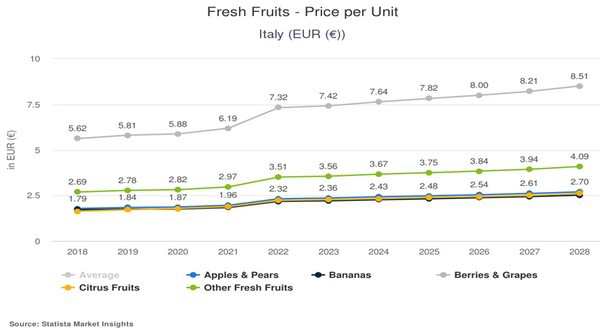In agriculture, this year has been characterized by significant disruptions in fresh produce supply chains. These disturbances are mainly due to unexpected meteorological phenomena and increases in production costs.
According to WikiFarmer co-founder and CEO Ilias Sousis, these disruptions can be seen in both Spain and Italy at the moment: “A clear example of this situation is found in Spanish olive oil production. Due to droughts, the yields of olive oil dropped significantly. This led to a steep price rise, making sought-after Spanish olive oil stocks hard to find. A similar situation is present due to heavy rainfalls in Italy.”
Especially in Italy, where Wikifarmer has established a firm presence in the last year, these problems are going to continue in the months to come, Sousis explains. “Our wholesale partners in Italy inform us that energy, fertilizer and plant costs have tripled and in some cases quadrupled in the last year. These conditions have mainly hurt small-scale producers, leading many of them to abandon their fields uncultivated, which has in turn resulted in steep drops in production volumes. More precisely, our partner told our agents that cherry, watermelon and stone fruit volumes have decreased about 30-40% year-over-year, and their quality has diminished as well. At the same time, prices of various crops rose greatly, as the decline in supply wasn’t followed by a parallel decrease in demand. These price climbs don’t only affect end-consumers, as they get passed on throughout the supply chain, impacting everyone.”
The following graph shows an upward trend in average unit prices for all fruit categories harvested in Italy.
The Wikifarmer platform helps the wholesale and food production industry mitigate the risks of supply chain disruptions, Sousis states: “We give them access to a wide, global network of suppliers, counting more than 14.000 vendors on our platform. This way, supply chain disruptions like logistical issues and crop failures don’t affect product availability, whereas the opposite would be true if a company only relied on a small pool of suppliers in specific geographical regions. Through Wikifarmer Market, purchasing managers of such companies get the chance to perform price and specification comparisons between offerings of many suppliers. As a result, they’re able to strike better deals, and source products of the quality and specifications that are more suitable to their needs.”
“This is not to say that it’s just logistical and meteorological conditions that affect the results of fresh produce wholesalers and FPUs that use it as raw material. There are internal factors that may even cause viability issues. That is why it is necessary for those companies to be offered flexible credit terms and quality guarantees, as to relieve the explosive combination of internal and external threats,” Sousis concludes.
For more information:
Ilias Sousis
Wikifarmer
Tel: +30 2106745250
Tel2: +30 6936113480
Email: [email protected]
www.wikifarmer.com

